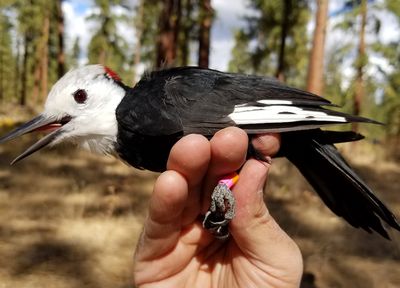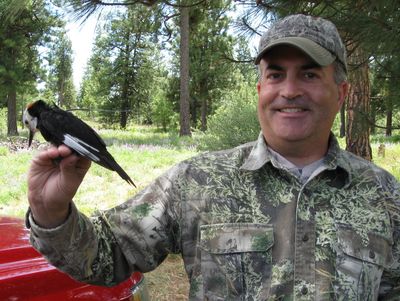Twenty Years of Field Research on the White-Headed Woodpecker in Washington | Jeff Kozma | September 2022 | YVAS Program
General ·Twenty Years of Field Research on the White-Headed Woodpecker in Washington with Jeff KozmaDid you know birders and naturalists come from all across the country to Washington’s eastside forests to seek out this charismatic species of woodpecker? If you ever wanted to know more about the White-headed Woodpecker, this presentation is for you! In Washington, the White-headed Woodpecker is listed as a species of concern due to its association with old-growth ponderosa pine forests. Although White-headed Woodpeckers have recently been documented inhabiting early to mid-seral managed forests, information is limited regarding their reproductive success and general ecology in these forests. For the last 20 years, Jeff Kozma, a wildlife biologist for the Yakama Nation, has been studying the ecology of White-headed Woodpeckers in managed ponderosa pine forests along the eastern Cascades in Yakima and Kittitas Counties. Jeff will present brief highlights from his research including nest-site characteristics, reproductive success, and nestling provisioning (i.e., who feeds the kids and what are they feeding them). He will also present a summary of findings from a long-term banding study he has been conducting since 2011 investigating adult longevity.
Posted by Yakima Valley Audubon Society on Monday, September 26, 2022
Did you know birders and naturalists come from all across the country to Washington’s eastside forests to seek out this charismatic species of woodpecker? If you ever wanted to know more about the White-headed Woodpecker, this presentation is for you!

In Washington, the White-headed Woodpecker is listed as a species of concern due to its association with old-growth ponderosa pine forests. Although White-headed Woodpeckers have recently been documented inhabiting early to mid-seral managed forests, information is limited regarding their reproductive success and general ecology in these forests. For the last 20 years, Jeff Kozma, a wildlife biologist for the Yakama Nation, has been studying the ecology of White-headed Woodpeckers in managed ponderosa pine forests along the eastern Cascades in Yakima and Kittitas Counties. Jeff will present brief highlights from his research including nest-site characteristics, reproductive success, and nestling provisioning (i.e., who feeds the kids and what are they feeding them). He will also present a summary of findings from a long-term banding study he has been conducting since 2011 investigating adult longevity.

About Jeff Kozma
Jeff received his B.S. Degree in Environmental Forest Biology from the College of Environmental Science and Forestry at Syracuse. He later received his M.S. Degree in Wildlife Science at Texas Tech University where he studied the use of Chihuahuan Desert arroyos and adjacent uplands by migrant and breeding birds in southern New Mexico. After graduating, he began working as a Wildlife Biologist at the Yakima Training Center where he monitored Sage Grouse, did raptor and non-game bird surveys, and was involved with restoration of seeps, springs, and riparian areas. He is currently working as a Wildlife Biologist for the Yakama Nation where he has been studying the reproductive biology of White-headed Woodpeckers and other cavity-nesting birds in managed forests since 2003, as well as reviewing timber sales on the ceded lands of the Yakama Nation to help protect habitat important to state and Federally listed species, as well as state species of concern.

